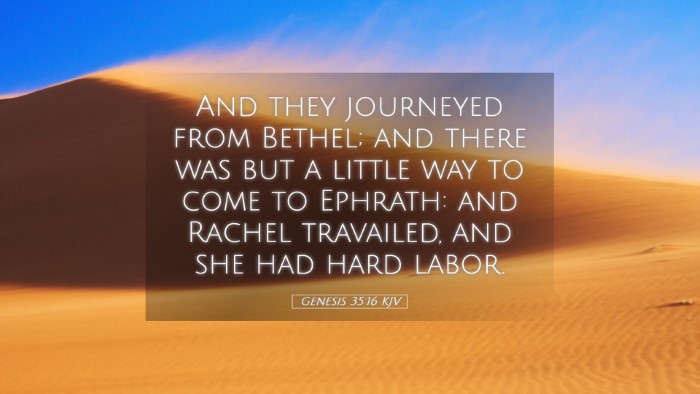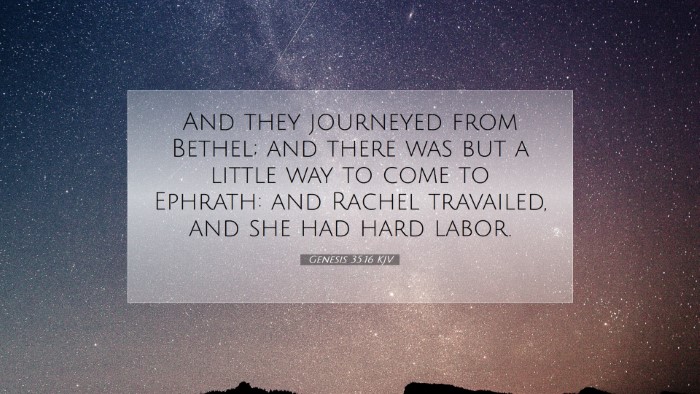Bible Commentary on Genesis 35:16
The verse Genesis 35:16 records an important moment in the life of Jacob and his family as they travel from Bethel toward Ephrath. The events surrounding this passage hold profound theological significance and are enriched by the insights of respected commentators.
Scriptural Context
Genesis 35:16 states, "Then they journeyed from Bethel; and when there was but a little way to come to Ephrath, Rachel travailed, and she had hard labor." This verse occurs after God had reaffirmed His covenant with Jacob and instructed him to return to Bethel, the place where Jacob had encountered God. The journey signifies a return to obedience and a redirection towards God's promised blessings.
Commentary Insights
Matthew Henry's Commentary
Matthew Henry notes that this verse illustrates both the physical journey of Jacob's family and the spiritual implications of that journey. He emphasizes the hardship Rachel experiences during childbirth, which can signify the struggles inherent in following God's call. Rachel’s travail speaks to the pains of labor that often accompany significant spiritual transitions:
- Labor and Hardship: Henry comments on the nature of Rachel's difficult labor, likening it to the anguish often experienced in the pursuit of God’s promises.
- Symbolism of Journey: The journey from Bethel to Ephrath serves as a metaphor for the believer's path, marked by trials that ultimately lead to fulfillment in God's purpose.
Albert Barnes' Notes on the Bible
Albert Barnes expands on the geographical and historical context of this journey, elaborating on the significance of the places mentioned:
- Geographical Significance: He explains that Bethel was known as a place of divine encounter, while Ephrath (or Bethlehem) became known as a significant center, particularly in the lineage of Christ. This journey marks an important transition not just for Jacob's family, but for the entire narrative of redemption.
- Rachel's Role: Barnes highlights Rachel's emotional and physical struggle, interpreting it as a critical moment in biblical history, noting the prophetic undertones linking her to future events, including the birthright of leadership through her son Benjamin.
Adam Clarke's Commentary
Adam Clarke provides an extensive analysis of the passage, focusing on Rachel's childbirth and the implications for the family:
- Rachel's Desperation: Clarke discusses Rachel's desire for children and how this leads to her feeling of emotional turmoil as she goes into labor, framing it within the larger narrative of her rivalry with Leah, Jacob's other wife.
- Divine Providence: He emphasizes that while Rachel experiences hardship, the Lord remains sovereign, and her struggles ultimately fulfill God's greater plan for Israel's heritage. Clarke interprets the situation as a reminder of the often-painful journey toward spiritual fulfillment.
Theological Implications
Genesis 35:16 serves as a microcosm of the greater narrative of Scripture, representing struggle, providence, and hope amidst trials. Several theological themes arise from the commentators' reflections:
- Covenant Faithfulness: The context highlights God's unwavering commitment to His covenant with Jacob and his descendants, providing a backdrop for understanding the journey as one of obedience and divine guidance.
- The Pain of Transition: Rachel's struggle in childbirth exemplifies the often painful transitions believers experience as they move toward fulfilling God’s will for their lives.
- Legacy and Redemption: Rachel gives birth to Benjamin during this tumultuous moment—this birth shapes the narrative of redemption throughout Scripture, demonstrating how God uses human struggle as part of His redemptive plan.
Conclusion
Genesis 35:16 thus invites deep reflection from pastors, students, theologians, and Bible scholars. The insights from Matthew Henry, Albert Barnes, and Adam Clarke offer a robust framework for understanding not only the historical significance of this passage but also its profound theological implications that resonate throughout the Christian faith. It reminds us that journeys of faith often entail difficulties, yet they also lead to God’s ultimate promises being fulfilled in our lives.


